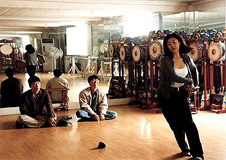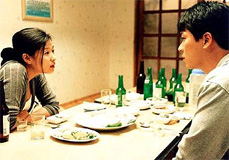|
Newest Reviews:
New Movies -
The Tunnel
V/H/S
The Tall Man
Mama Africa
Detention
Brake
Ted
Tomboy
Brownian Movement
Last Ride
[Rec]³: Genesis
Hara-Kiri: Death of a Samurai
Indie Game: The Movie
Abraham Lincoln: Vampire Hunter
Old Movies -
Touki Bouki: The Journey of the Hyena
Drums Along the Mohawk
The Chase
The Heiress
Show
People
The Strange Affair of Uncle Harry
Pitfall
Driftwood
Miracle Mile
The Great Flamarion
Dark Habits
Archives -
Recap: 2000,
2001, 2002,
2003, 2004
, 2005, 2006,
2007 , 2008
, 2009 ,
2010 , 2011 ,
2012
All reviews alphabetically
All reviews by star rating
All reviews by release year
Masterpieces
Screening Log
Links
FAQ
E-mail me
HOME
| |
The Turning Gate (Sang-soo Hong) 2002
 Though it takes a while for its real emotional heft to be
made apparent, Sang-soo Hong’s South Korean drama The Turning Gate eventually grows into an insightful and astutely
realized examination of the ways that we accumulate the emotional baggage that we carry as we move through
our romantic entanglements. As the movie opens, Kyung-soo, a fitfully employed
actor, receives a call from an out of town old schoolmate who, in a drunken
stupor, invites him to spend some time with him. With seemingly nothing better
to do, Kyung-soo accepts this invitation, and upon meeting up with his old
friend, the mood is tentative at best, though alcoholic and feminine
distractions do a bit to close the rift that’s grown between the two. Soon
however, those feminine distractions take over, and Kyung-soo finds himself
devoting his attention to a young college freshman who begins to like him more
than he likes her. The main irony in their relationship is that she was
initially reluctant to get involved with him until he convinced her that he was
interested in getting more than sex from her. Her naiveté is a detriment to her
happiness, and without much apparent heartbreak, Kyung-soo heads off for home as
scheduled after a few days, leaving her behind.
Though it takes a while for its real emotional heft to be
made apparent, Sang-soo Hong’s South Korean drama The Turning Gate eventually grows into an insightful and astutely
realized examination of the ways that we accumulate the emotional baggage that we carry as we move through
our romantic entanglements. As the movie opens, Kyung-soo, a fitfully employed
actor, receives a call from an out of town old schoolmate who, in a drunken
stupor, invites him to spend some time with him. With seemingly nothing better
to do, Kyung-soo accepts this invitation, and upon meeting up with his old
friend, the mood is tentative at best, though alcoholic and feminine
distractions do a bit to close the rift that’s grown between the two. Soon
however, those feminine distractions take over, and Kyung-soo finds himself
devoting his attention to a young college freshman who begins to like him more
than he likes her. The main irony in their relationship is that she was
initially reluctant to get involved with him until he convinced her that he was
interested in getting more than sex from her. Her naiveté is a detriment to her
happiness, and without much apparent heartbreak, Kyung-soo heads off for home as
scheduled after a few days, leaving her behind.
 Up until this point, The
Turning Gate is a slightly quirky, sharply observed character study that
examines many of the same psychological issues that stood at the center of Vertigo
with none of the suspense elements that powered Hitchcock’s film. As Kyung-soo
pursues a second serendipitous romance that immediately follows the first, he
seems to be the more vigorous pursuer. After the second girl reveals a few
startlingly coincidental details from her past, he begins to be drawn even
closer to her, convinced that their coupling is resultant of some dictum of
fate. This new open-mindedness
seems as informed by his earlier relationship as anything that the second girl
says, however, and before long Kyung-soo is noticing coincidences and parallels
between the two couplings that he almost definitely wouldn’t have noticed had
he not been so smitten (though the question of which girl it is that he’s
really smitten with is certainly a bone of contention). Because he’s so aware
of his past misdeeds because of the way that they continue to influence his
present, when he desperately confesses his love to the second woman, it’s as
if he’s trying to make amends for every failed relationship that he’s had up
until that point. The complexity of his character’s experience is cumulative,
and develops only after we spend some time with him, and as a result The Turning Gate is a movie that begs for a second viewing, in which
the viewer can reevaluate his early, seemingly unmotivated actions.
Up until this point, The
Turning Gate is a slightly quirky, sharply observed character study that
examines many of the same psychological issues that stood at the center of Vertigo
with none of the suspense elements that powered Hitchcock’s film. As Kyung-soo
pursues a second serendipitous romance that immediately follows the first, he
seems to be the more vigorous pursuer. After the second girl reveals a few
startlingly coincidental details from her past, he begins to be drawn even
closer to her, convinced that their coupling is resultant of some dictum of
fate. This new open-mindedness
seems as informed by his earlier relationship as anything that the second girl
says, however, and before long Kyung-soo is noticing coincidences and parallels
between the two couplings that he almost definitely wouldn’t have noticed had
he not been so smitten (though the question of which girl it is that he’s
really smitten with is certainly a bone of contention). Because he’s so aware
of his past misdeeds because of the way that they continue to influence his
present, when he desperately confesses his love to the second woman, it’s as
if he’s trying to make amends for every failed relationship that he’s had up
until that point. The complexity of his character’s experience is cumulative,
and develops only after we spend some time with him, and as a result The Turning Gate is a movie that begs for a second viewing, in which
the viewer can reevaluate his early, seemingly unmotivated actions.
* * *
10-18-02
Jeremy Heilman
|